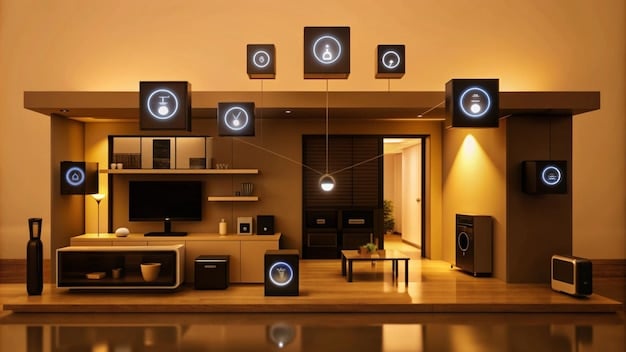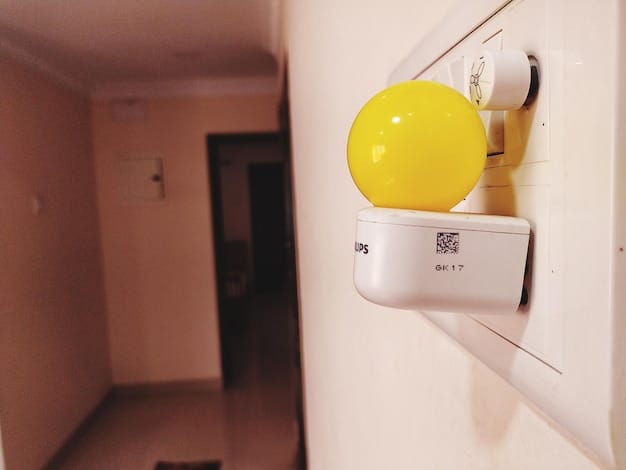Smart Home Hubs: Choosing the Best Ecosystem for Your Needs

Choosing the best smart home hub involves considering compatibility, ecosystem features, privacy, and budget to seamlessly integrate and control your smart devices.
Navigating the world of smart home technology can be overwhelming, especially when it comes to choosing the right hub. With so many options available, understanding the nuances of each ecosystem is crucial. This guide, Smart Home Hubs: Choosing the Best Ecosystem for Your Needs, will help clarify the key considerations and empower you to make an informed decision.
Understanding Smart Home Hubs
At the heart of any smart home is the hub, acting as the central control point for all your connected devices. It’s the conductor of your digital orchestra, ensuring that your lights, thermostats, security systems, and entertainment devices work in harmony. But what exactly should you look for in a smart home hub?
Think of a smart home hub as the translator in a multilingual household. It speaks various “languages” or protocols, such as Zigbee, Z-Wave, Bluetooth, and Wi-Fi, allowing devices that don’t natively communicate with each other to work together seamlessly. A good hub not only connects your devices but also simplifies their management.

Key Ecosystems: Apple, Google, and Amazon
The smart home market is dominated by a few key players, each offering its own unique ecosystem. Understanding the strengths and weaknesses of these ecosystems is vital in choosing the right hub for your needs. We will explore the main players in this field, highlighting key features.
Apple HomeKit
Apple’s HomeKit emphasizes security and privacy, offering end-to-end encryption for all communications. It integrates seamlessly with iOS devices, allowing control through Siri and the Home app. However, HomeKit has a smaller range of compatible devices compared to other ecosystems.
Google Assistant
Google Assistant is known for its powerful AI and voice recognition capabilities. It works well with Android devices and offers a wide range of compatible devices. Google’s ecosystem is also strong in learning your habits and automating tasks, making your home truly smart.
Amazon Alexa
Amazon Alexa boasts the largest selection of compatible devices, making it a versatile choice for many users. Alexa also excels in voice control and integrates seamlessly with Amazon’s other services, such as Amazon Music and Prime Video. However, some users have concerns about Amazon’s data collection practices.
Compatibility: Ensuring Your Devices Work Together
One of the most critical factors when choosing a smart home hub is compatibility. Not all devices work with all hubs, so it’s essential to ensure that the hub you choose supports the devices you already have or plan to purchase in the future. This will determine how smooth your experience will be with your smart home setup.
Compatibility isn’t just about whether a device connects to a hub; it’s also about the level of integration. Some devices may offer basic functionality through a hub, while others may provide advanced features. Always check the specifications and user reviews to understand the extent of compatibility.
- Check Device Specifications: Before buying a hub, list all your smart devices and check their compatibility with different ecosystems.
- Consider Protocols: Ensure the hub supports the communication protocols (Zigbee, Z-Wave, Bluetooth) used by your devices.
- Read User Reviews: User reviews often provide valuable insights into real-world compatibility issues.

Privacy and Security Considerations
In an increasingly connected world, privacy and security are paramount. Smart home hubs collect a vast amount of data about your habits and activities, making them a potential target for hackers. Choosing a hub with robust security features is crucial to protecting your personal information. These are things no user should ignore.
Look for hubs that offer end-to-end encryption, multi-factor authentication, and regular security updates. Understand the company’s data privacy policies and consider whether you’re comfortable with how your data is being used. One example is Amazon, which has been in the news due to privacy problems in the past.
Key Security Features
- End-to-End Encryption: Ensures that your data is protected from eavesdropping.
- Multi-Factor Authentication: Adds an extra layer of security by requiring multiple forms of identification.
- Regular Security Updates: Keeps your hub protected against the latest threats.
Features and Functionality
Beyond basic connectivity, smart home hubs offer a range of features and functionalities that can enhance your smart home experience. Voice control, automation, and remote access are just a few of the capabilities to consider. Not all features are equal, so make sure your decision is an informed one.
Evaluate which features are most important to you. Do you want a hub that excels in voice control? Are you looking for advanced automation capabilities? Do you need remote access to your devices while you’re away from home? Answering these questions will help narrow down your options.
Voice Control
Voice control allows you to control your devices hands-free using voice commands. All major ecosystems (Apple, Google, Amazon) offer voice control, but the quality and reliability can vary.
Automation
Automation allows you to create routines and schedules that automate tasks in your home. For example, you can set your lights to turn on automatically at sunset or your thermostat to adjust based on the time of day.
Remote Access
Remote access allows you to control your devices from anywhere in the world using your smartphone or tablet. This is particularly useful for security systems, thermostats, and lighting.
Budget Considerations and Long-Term Costs
The initial cost of a smart home hub is just one factor to consider. You should also factor in the long-term costs, such as subscription fees, additional device costs, and potential energy savings. Having a solid plan for the present and the future is key.
Some smart home services require a subscription fee for advanced features or cloud storage. Additionally, some devices may be more expensive within certain ecosystems. Consider the potential energy savings from smart thermostats and lighting, which can offset some of the upfront costs.
- Compare Initial Costs: Compare the prices of different hubs and their compatible devices.
- Factor in Subscription Fees: Check for any subscription fees required for advanced features or cloud storage.
- Consider Energy Savings: Evaluate the potential energy savings from smart thermostats and lighting.
“`html
| Key Aspect | Brief Description |
|---|---|
| 💡 Compatibility | Ensures all your smart devices can connect and function with the hub. |
| 🔒 Privacy & Security | Protects your personal data with features like encryption and multi-factor authentication. |
| 🗣️ Voice Control | Allows hands-free control of your smart devices using voice commands. |
| 💰 Budget | Considers initial costs, subscription fees, and potential long-term energy savings. |
“`
Frequently Asked Questions (FAQ)
▼
A smart home hub is a central device that connects and controls various smart devices in your home, allowing them to communicate and work together seamlessly. It simplifies management and enhances automation.
▼
Apple’s HomeKit is often considered the best for privacy due to its strong emphasis on end-to-end encryption and minimal data collection. This ensures higher data protection.
▼
While some devices may work across ecosystems through integrations or third-party services, optimal performance is usually achieved when devices are within the same ecosystem.
▼
Compatibility is crucial. Ensure the hub supports the devices you already have or plan to buy. Check for communication protocols and read the user reviews for integration insights.
▼
Consider the initial cost, subscription fees for services and potential long-term energy savings. Some hubs offer features that may require a plan, like cloud storage or enhanced AI.
Conclusion
Choosing the right smart home hub is a critical decision that can significantly impact your smart home experience. By carefully considering compatibility, privacy, features, and budget, you can select an ecosystem that meets your specific needs and creates a truly connected home.





